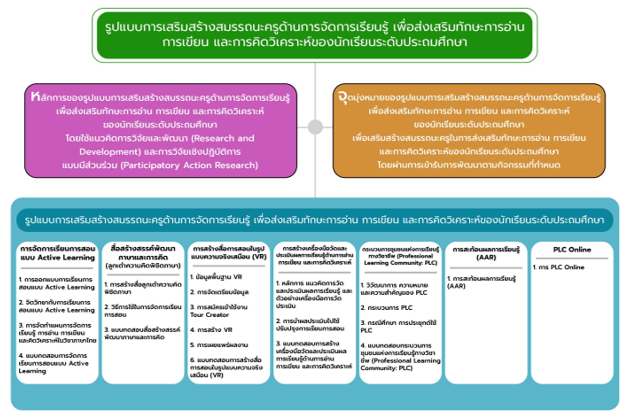การพัฒนารูปแบบการเสริมสร้างสมรรถนะครูด้านการจัดการเรียนรู้เพื่อส่งเสริมทักษะการอ่าน การเขียน และการคิดวิเคราะห์ของนักเรียนระดับประถมศึกษา
Main Article Content
บทคัดย่อ
การวิจัยครั้งนี้มีวัตถุประสงค์เพื่อ 1) ศึกษาสภาพบริบทและความต้องการเสริมสร้างสมรรถนะครูด้านการจัดการเรียนรู้เพื่อส่งเสริมทักษะการอ่าน การเขียน และการคิดวิเคราะห์ของนักเรียนระดับประถมศึกษา 2) สร้างและพัฒนา และทดลองใช้รูปแบบการเสริมสร้างสมรรถนะครูด้านการจัดการเรียนรู้เพื่อส่งเสริมทักษะการอ่าน การเขียน และการคิดวิเคราะห์ของนักเรียนระดับประถมศึกษา กลุ่มเป้าหมาย ได้แก่ ศึกษานิเทศก์ ผู้อำนวยการโรงเรียน ครูผู้สอนรายวิชาภาษาไทยและนักเรียนระดับชั้นประถมศึกษาปีที่ 3 และประถมศึกษาปีที่ 4 ได้มาจากการเลือกแบบเจาะจง เครื่องมือที่ใช้ในการวิจัย ได้แก่ แบบประเมินความรู้ความเข้าใจ เครื่องมือวัดและประเมินผลทักษะการอ่าน การเขียน และการคิดวิเคราะห์ วิเคราะห์ข้อมูลด้วยการหาความถี่ ร้อยละ ค่าเฉลี่ย ส่วนเบี่ยงเบนมาตรฐาน และการวิเคราะห์เนื้อหา
ผลการวิจัย พบว่า 1) สภาพการเสริมสร้างสมรรถนะครูด้านการจัดการเรียนรู้เพื่อส่งเสริมทักษะการอ่าน การเขียน และการคิดวิเคราะห์ของนักเรียนระดับประถมศึกษา ในภาพรวมครูผู้สอนใช้สื่อประกอบการจัดการเรียนรู้เพื่อส่งเสริมทักษะการอ่าน การเขียน และการคิดวิเคราะห์ ในรูปแบบเดิม ๆ ไม่น่าสนใจ รวมทั้งรูปแบบการสอนยังไม่มุ่งเน้นการสอนแบบ Active Learning เท่าที่ควร ครูมีความต้องการเสริมสร้างสมรรถนะด้านการจัดการเรียนการสอน เทคนิคการสอน การผลิตสื่อ การสร้างแบบวัดประเมินผลที่มีประสิทธิภาพสอดคล้องกับผู้เรียนแต่ละระดับ และกระบวนการชุมชนแห่งเรียนรู้ทางวิชาชีพ 2) รูปแบบการเสริมสร้างสมรรถนะครูด้านการจัดการเรียนรู้เพื่อส่งเสริมทักษะการอ่าน การเขียน และการคิดวิเคราะห์ของนักเรียนระดับประถมศึกษา ประกอบด้วย 3 องค์ประกอบ ได้แก่ 1) หลักการของรูปแบบ 2) จุดมุ่งหมายของรูปแบบ และ 3) องค์ประกอบหลักและองค์ประกอบย่อยของรูปแบบ โดยรูปแบบ ฯ มีความเหมาะสมอยู่ในระดับมากและมีความสอดคล้องอยู่ในระดับมากที่สุด และ 3) ครูผู้สอนมีความรู้ความเข้าใจการเสริมสร้างสมรรถนะครูด้านการจัดการเรียนรู้ เพื่อส่งเสริมทักษะการอ่าน การเขียน และการคิดวิเคราะห์ในภาพรวมอยู่ในระดับดีมาก และหลังการทดลองใช้รูปแบบนักเรียนมีผลสัมฤทธิ์ทางการเรียนรายวิชาภาษาไทยสูงขึ้นกว่าก่อนการทดลอง
Downloads
Article Details

อนุญาตภายใต้เงื่อนไข Creative Commons Attribution-NonCommercial-NoDerivatives 4.0 International License.
เอกสารอ้างอิง
กระทรวงศึกษาธิการ. (2561). หลักสูตรแกนกลางการศึกษาขั้นพื้นฐาน พุทธศักราช 2551 (ฉบับปรับปรุง พ.ศ. 2560). กรุงเทพฯ: โรงพิมพ์ชุมนุม สหกรณ์การเกษตรแห่งประเทศไทย จำกัด.
จุฑามาศ เพิ่มพูนเจริญยศ. (2561). การพัฒนาการจัดการเรียนรู้เชิงรุกผ่านห้องเรียนอัจฉริยะสำหรับนักเรียนระดับชั้นประถมศึกษาปีที่ 6 โรงเรียนอนุบาลไทรโยค. (วิทยานิพนธ์วิทยาศาสตรมหาบัณฑิต, สาขาวิชาเทคโนโลยีสารสนเทศ มหาวิทยาลัยศรีปทุม).
ฉัตรชัย หวังมีจงมี และองอาจ นัยพัฒน์. (2560). สมรรถนะของครูไทยในศตวรรษที่ 21: ปรับการเรียน เปลี่ยนสมรรถนะ. Journal of HRintelligence, 12(2), 47-63.
ไฉไลศรี เพชรใต้ และพชรวิทย์ จันทร์ศิริสิร. (2564). ความต้องการจำเป็นและแนวทางการเสริมสร้างสมรรถนะการจัดการเรียนรู้ ของครูประถมศึกษา สังกัดสำนักงานคณะกรรมการการศึกษาขั้นพื้นฐาน. วารสารชุมชนวิจัย, 15(4), 222-234.
ทองพรรณ ปัญญาอุดมกุล. (2563). แนวทางการพัฒนาการใช้กระบวนการ PLC (Professional Learning Community) เพื่อพัฒนาคุณภาพการจัดการเรียนรู้ของครูโรงเรียนบ้านนาอ้อม สังกัดสำนักงานเขตพื้นที่การศึกษาประถมศึกษาพะเยา เขต 2. คุรุสภาวิทยาจารย์, 1(1), 45-55.
นฤมล คล้ายริน. (2564). การพัฒนารูปแบบเพื่อพัฒนาสมรรถนะครูด้านการจัดการเรียนรู้เชิงรุก สำหรับครูโรงเรียนเทศบาลอินทปัญา วัดใหญ่อินทาราม สังกัดเทศบาลเมืองชลบุรี. HRD JOURNAL, 12(2), 58-74.
ประยูร บุญใช้. (2563). สมรรถนะการจัดการเรียนรู้เพื่อพัฒนาผู้เรียนในศตวรรษที่ 21 ของครูประถมศึกษา. วารสารเซนต์จอห์น, 23(33), 240-258.
ประยูร บุญใช้. (2564). การพัฒนารูปแบบการเสริมสร้างสมรรถนะการจัดการเรียนรู้เพื่อพัฒนาผู้เรียนในศตวรรษที่ 21 สำหรับครูประถมศึกษา. วารสารพัฒนาการเรียนการสอน มหาวิทยาลัยรังสิต, 15(1), 118-137.
ประเวศ เวชชะ. (2561). การบริหารหลักสูตร การสอน การวัดและประเมินผลการเรียนรู้. (พิมพ์ครั้งที่ 3). เชียงราย: มหาวิทยาลัยราชภัฏเชียงราย.
พวงเพ็ญ อินทรประวัติ, ณฐกร ดวงพระเกษ และฐิติรัตน์ คล่องดี. (2564). สมรรถนะของครู 4 ด้านที่ผลต่อการเรียนรู้ของผู้เรียนมากที่สุด. วารสารวิชาการศึกษาศาสตร์, 22(1), 180-195.
ศูนย์ศึกษาการพัฒนาครูและบุคลากรทางการศึกษา. (2562). รายงานการดำเนินงานโครงการยกระดับคุณภาพการจัดการเรียนรู้ด้านการอ่าน การเขียน และการคิดวิเคราะห์ของนักเรียนในระดับการศึกษาขั้นพื้นฐาน. ลำปาง: มหาวิทยาลัยราชภัฏลำปาง.
สมาพันธ์ครู. (2563). แนวทางการพัฒนาสมรรถนะครูในศตวรรษที่ 21. สืบค้นจาก https://karusatpanya.org/การพัฒนา-สมรรถนะ/
สถาบันส่งเสริมการสอนวิทยาศาสตร์และเทคโนโลยี. (2562). ผลการประเมิน PISA 2018: บทสรุปผู้บริหาร. กรุงเทพฯ: สถาบันส่งเสริมการสอนวิทยาศาสตร์และเทคโนโลยี (สสวท.)
สิทธิพงษ์ สุพรม. (2561). การพัฒนาความสามารถในการเรียนรู้เชิงรุกในศตวรรษที่ 21 สำหรับนักเรียนชั้นมัธยมศึกษาตอนต้น. วารสารวิจัยและประเมินผลอุบลราชธานี, 7(2), 49-58.
สำนักงานเลขาธิการสภาการศึกษา. (2560). แผนการศึกษาแห่งชาติ พ.ศ. 2560-2579. กรุงเทพฯ: พริกหวานกราฟฟิค จำกัด.
International Institute for Management Development: IMD. (2018). World competitiveness yearbook 2018. Switzerland: Lausanne.
Sweller, J. (2006). The worked example effect and human cognition: Learning and Instruction. New Jersey: Educational Technilogies.
Tyler, R.W. (1950). Basic principles of curriculum and instruction. Chicago: University of Chicago Press.


